
Midtown Madness is a 1999 racing game developed by Angel Studios and published by Microsoft for Microsoft Windows. The demo version was released in April 1999. Two sequels followed, with Midtown Madness 2 released in September 2000 and Midtown Madness 3 released in June 2003 for the Xbox. The game is set in Chicago; the object is for the player to win street races and obtain new cars.

Need for Speed: High Stakes, released as Need for Speed: Road Challenge in Europe, is a 1999 racing video game developed by EA Canada and EA Seattle and published by Electronic Arts for the PlayStation and Microsoft Windows. It is the fourth game in the Need for Speed series and a follow-up to Need for Speed III: Hot Pursuit. The game features more realistic elements than its predecessors and introduced a damage system that allows cars to take damage when colliding with objects, affecting their appearance and performance. It also introduced a series of economy-based tournaments, awarding players with a cash prize that can be spent on repairing, purchasing, or upgrading cars for subsequent races. The game's Hot Pursuit mode, which was introduced in Hot Pursuit, was expanded with more options, allowing players to control police pursuits attempting to stop racers.

Need for Speed: Porsche Unleashed, released as Need for Speed: Porsche 2000 in Europe and Need for Speed: Porsche in Latin America and Germany, is a 2000 racing video game. It is the fifth installment in the Need for Speed series. Unlike other NFS titles, Porsche Unleashed centers on racing Porsche sports cars, with models ranging from years 1950 to 2000. The game generally considered the final classic Need for Speed title before EA Black Box took over development for mainline entries in the series for many years beginning with the PS2 version of Need for Speed: Hot Pursuit 2. The game also marked the beginning of a 16 year exclusive licensing agreement between Porsche and EA that began in 2000 and ended in 2016 that prohibited most other developers from featuring Porsche cars in other video games without receiving a sub-license from EA. As a result of the licensing deal many games used Ruf models in place of Porsche to circumvent Porsche's licensing as Ruf is considered by the German government to be a full-fledged manufacturer, and as such Ruf models have unique VINs.
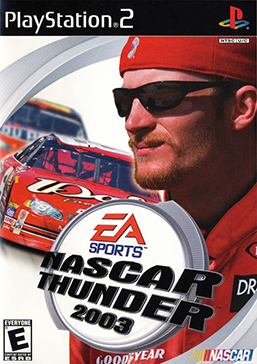
NASCAR Thunder 2003 is the sixth edition of the EA Sports' NASCAR racing simulator series. Developed by EA Tiburon and Budcat Creations and published by EA Sports. It was released for PlayStation, PlayStation 2, GameCube, and Xbox on September 18, 2002, and for Microsoft Windows on October 21. The product features Dale Earnhardt Jr. on the cover. It was the first time the NASCAR's Most Popular Driver Award recipient was featured on the cover, although he did not win the award for the first time until the following year. Dale Earnhardt appeared in the game as a driver as a result of entering his name as a Create-A-Car driver's name; he did not appear in the previous game due to his death. He appeared as a legend in subsequent games.

Monster Truck Madness is a racing video game developed by Terminal Reality and published by Microsoft. It was released in North America on September 9, 1996. The game has twelve monster trucks and tasks the player with beating computer opponents. Checkpoints, multiple hidden shortcuts, and interactable objects commonly appear in the tracks. In the garage, the player modifies the truck to account for terrain surfaces. Online multiplayer is accessed with a modem, a local area network (LAN), or TCP/IP.

Sports Car GT is a 1999 racing sim video game published by Electronic Arts (EA). Based on real-life sports car racing, it is a simulator but with a slight arcade-style gameplay. It was developed by Image Space Incorporated (ISI) for Microsoft Windows, and by Point of View for PlayStation, resulting in two distinct versions.

Destruction Derby 2 is a 1996 vehicular combat racing video game developed by Reflections Interactive and published by Psygnosis for PlayStation and Microsoft Windows. The sequel to Destruction Derby (1995) and developed by the same team, players race with the goal of earning points by damaging opponent cars. Standard races and matches based in arenas with the goal of remaining the last player driving are also available.
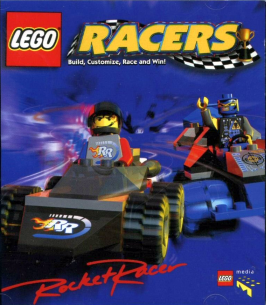
Lego Racers is a 1999 Lego-themed kart racing video game developed by High Voltage Software and published by Lego Media for Microsoft Windows, followed by console ports to Nintendo 64 and PlayStation. Set in the fictional "Legoland" universe, the single-player mode follows various minifigure characters competing in a racing competition created by a fictional racing champion called Rocket Racer.

TOCA: Touring Car Championship is a 3D racing video game licensed by series organisers TOCA, and developed and published by Codemasters for the PlayStation and Microsoft Windows platforms in 1997-1998. It was re-released by Codemasters for the Game Boy Color in 2000. It was the first entry in the eponymous series and was followed by TOCA 2 Touring Cars in 1998. The player takes control of a driver who races for one of the eight works teams that contested the 1997 British Touring Car Championship against fifteen AI competitors on one of the nine championship circuits. A championship mode is available for players with the objective of earning points to continue competing and unlocking new features.
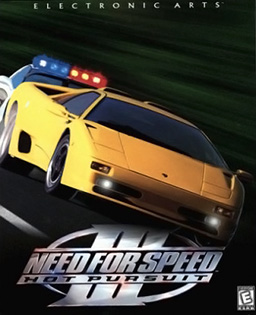
Need for Speed III: Hot Pursuit is a 1998 racing video game developed for PlayStation by EA Canada and Microsoft Windows by EA Seattle, and published by Electronic Arts. It is the third major installment in the Need for Speed franchise, incorporating police pursuits as a major part of gameplay. Hot Pursuit remains focused on racing using exotic sports cars, but features races that primarily take place in locations within North America, including varied settings and climates. Police AI is improved over the first game, utilizing several tactics to stop both the player and opponent. The PlayStation version was released on March 25, 1998, while the Windows version was released on October 12 the same year. The game received critical success, with praise for its graphics and customization options. It received a direct sequel in 2002 and a reboot in 2010.

Test Drive 6 is a racing video game developed by Pitbull Syndicate for PlayStation, Microsoft Windows and Dreamcast. In the United States the game was published by Infogrames North America, while in Europe the game was published by Cryo Interactive. The game featured 37 licensed cars, plus four police car variants. As a first for the series, cars from General Motors are not playable in this game, instead they appear as traffic cars. The soundtrack featured industrial rock and techno music from artists such as Fear Factory, Lunatic Calm and Cirrus.
Greg Siegele is an Australian businessman. He co-founded Ratbag Games Pty Ltd, an Australian video game developer of such games as Powerslide, The Dukes of Hazzard: Return of the General Lee and World of Outlaws: Sprint Cars 2002.

TOCA 2: Touring Cars is a British racing video game developed and published by Codemasters for PlayStation and Microsoft Windows. It is the second game in the TOCA series, based on the 1998 season of the British Touring Car Championship. Mainly an annual franchise update of cars and tracks, the game added more detailed graphics, physics, multiplayer modes and other minor features. Realistic tracks were added, and support races such as Ford Fiestas, Formula Ford and others also arrived. The level of car damage possible during a race was also enhanced, which was a significant selling point compared with the likes of Gran Turismo which had no damage model at the time.
Dirt Track Racing 2 (DTR2) is a video game developed by the now defunct Ratbag Games and published by Infogrames. It is the third and final game in the Dirt Track Racing series by Ratbag.

World of Outlaws: Sprint Cars 2002, also known as simply World of Outlaws: Sprint Cars for the Microsoft Windows and PAL region PlayStation 2 versions, is a sprint car racing video game developed by the Australian developer Ratbag Games and published by Ignition Entertainment in the PAL region and Infogrames in North America for the PS2 and Windows. GameSpot's review of the former console version described its gameplay as "solid" and the physics as "top-notch". The game had a limited sales run; it developed a large following and was widely requested at video game stores.
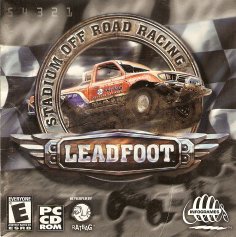
Leadfoot: Stadium Off-Road Racing, or Leadfoot for short, is a computer video game by the now defunct Ratbag Games. It is a spin-off of the dirt track racing series by Ratbag, which includes Dirt Track Racing, Dirt Track Racing: Sprint Cars and Dirt Track Racing 2. It is a racing game simulation reproducing the sport of stadium off-road racing. Pick-up trucks and buggies race around dirt tracks built inside stadiums - Supercross on four wheels.

Dirt Track Racing is a video game by the now defunct developer Ratbag Games. It is the first game in the series, which includes Dirt Track Racing, Dirt Track Racing: Sprint Cars, and Dirt Track Racing 2.
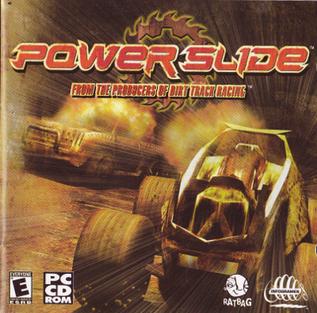
Powerslide is a post-apocalyptic Microsoft Windows racing game by Australian developer Ratbag Games. It was released in Australia, United States and Europe in 1998. Powerslide was praised for its graphics and AI in particular. A sequel, Powerslide: Slipstream, was in development as of 2004, but Ratbag couldn't find a suitable publisher, and shortly after the company was shut down. Powerslide was re-released on GOG.com in 2012.

Superbike 2001 is a motorcycle racing video game developed by Milestone srl, published by Electronic Arts (EA), and released in 2000 for Microsoft Windows. It is part of EA's Superbike video game series.

F1 2001 is a racing video game developed by Image Space Incorporated for the Microsoft Windows version and EA UK for the PlayStation 2 and Xbox version and published by EA Sports for Microsoft Windows, PlayStation 2 and Xbox. It is based on the 2001 Formula One season. A port for GameCube was planned, but cancelled for unknown reasons, and eventually released with minor changes as F1 2002. A Game Boy Color version was also cancelled during development.


















